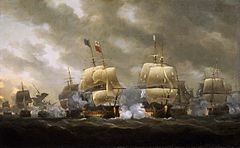Edward Hawke, 1st Baron Hawke
Edward Hawke, 1st Baron Hawke KB PC (born February 21, 1705 in London , † October 17, 1781 in Sunbury , Middlesex ) was an English admiral. He won the sea battle at Cape Finisterre and the sea battle in the Bay of Quiberon . Most recently he was First Lord of the Admiralty .
Life
Hawke came from a middle-class family. The father was a lawyer, the grandfather was a businessman. One uncle, Martin Bladen , was a member of the House of Commons . Edward later owed a certain amount of patronage to this, which promoted his career. He also later took his parliamentary seat.
The beginning of his career in the British Navy was not very spectacular. He joined the Royal Navy in 1719 or 1720 . After he had become ship commander in 1734, he rose further through his ability. He first commanded the Flamborough frigate in the West Indies. In 1743 he returned to Great Britain and was given command of the Berwick ship of the line with 70 cannons. With this he sailed into the Mediterranean. He took part in the Battle of Toulon during the War of the Austrian Succession in 1744 . He defeated an opposing ship, left the fleet line and took another Spanish ship.
In 1747 he became Rear Admiral under Admiral Peter Warren . After the admiral fell ill, Hawke took over command on a substitute basis. In the second naval battle at Cape Finisterre in 1747, he defeated the French escort of a large convoy with his much stronger fleet. Most of the enemy warships were seized, and because of their own heavy losses, the merchant ships could not be pursued. For this success he was awarded the Bath Order. In the same year he became a member of the House of Commons for Portsmouth .
In May 1748, Hawke was named vice admiral. He commanded the Canal Fleet until the beginning of the Seven Years' War . In 1755 he became the commander of the Western Fleet. Even before the war began , a total of 300 French merchant ships were seized on his orders as part of the colonial war that had already been fought in America . This was intended to disrupt the French mobilization and it was also a reaction to the success of French privateers.
Hawke became Commander of the Mediterranean Fleet in 1756 . His attempt to terrorize Port Mahon in Menorca failed. However, he managed to prevent the French fleet from leaving Toulon . From February 1757 he was Admiral of the Blue Flag of the Canal Fleet and blocked the Atlantic coast of France first together with George Anson, 1st Baron Anson , and later as Commander. The concept of permanent blockade of the coast, regardless of the weather, originates from him. This procedure was also used successfully in later wars. In contrast, an expedition against the port city of Rochefort failed . Only the island of Île-d'Aix could be captured. On April 5, 1758, near the island, he defeated a French squadron that was supposed to protect supplies for the French army in Canada. The victory hastened the fall of Louisbourg .
Hawke blocked the port of Brest in 1759 with the ships under his command. The French fleet broke out of the harbor to begin an invasion of England. Hawke pursued and destroyed the fleet in a three-hour battle on November 20th in Quiberon Bay. As a result, the French fleet lost a large part of its fighting power.
The House of Commons thanked the Admiral and suspended a pension of £ 2,000. The government did not thank him. The reason was Hawkes' tense relationship with Prime Minister William Pitt, 1st Earl of Chatham , and Anson, now First Lord of the Admiralty. Then he initially participated in the coastal blockade again. In October 1762 he was appointed Admiral of the White Flag. A year later he became Vice Admiral of England. Hawkes became Admiral of the Fleet in 1768 . Between 1766 and 1771 he was First Lord of the Admiralty. He was a member of the government and commander in chief of the navy.
In 1776 he was promoted to Baron Hawke , of Towton in the County of York . Hawke died in 1781; his son Martin inherited his title .
Various geographic points were named after Hawke. These include Cape Hawke ( New South Wales ) and Hawke Bay in New Zealand , a Hawke Bay in Newfoundland .
literature
- Georg von Alten (Hrsg.): Handbook for Army and Fleet. Vol. 4. Berlin et al. 1912 p. 677
- William Stewart: Admirals of the World. Jefferson, 2009 pp. 161f.
- Mark Grossmann: World Military Leaders. New York, 2007 pp. 147f.
| predecessor | Office | successor |
|---|---|---|
| Charles Saunders |
First Lord of the Admiralty 1766–1781 |
John Montagu |
| New title created |
Baron Hawke 1776-1781 |
Martin Hawke |
| personal data | |
|---|---|
| SURNAME | Hawke, Edward, 1st Baron Hawke |
| ALTERNATIVE NAMES | Hawke, Edward |
| BRIEF DESCRIPTION | British admiral |
| DATE OF BIRTH | February 21, 1705 |
| PLACE OF BIRTH | London |
| DATE OF DEATH | October 17, 1781 |
| Place of death | Sunbury |


